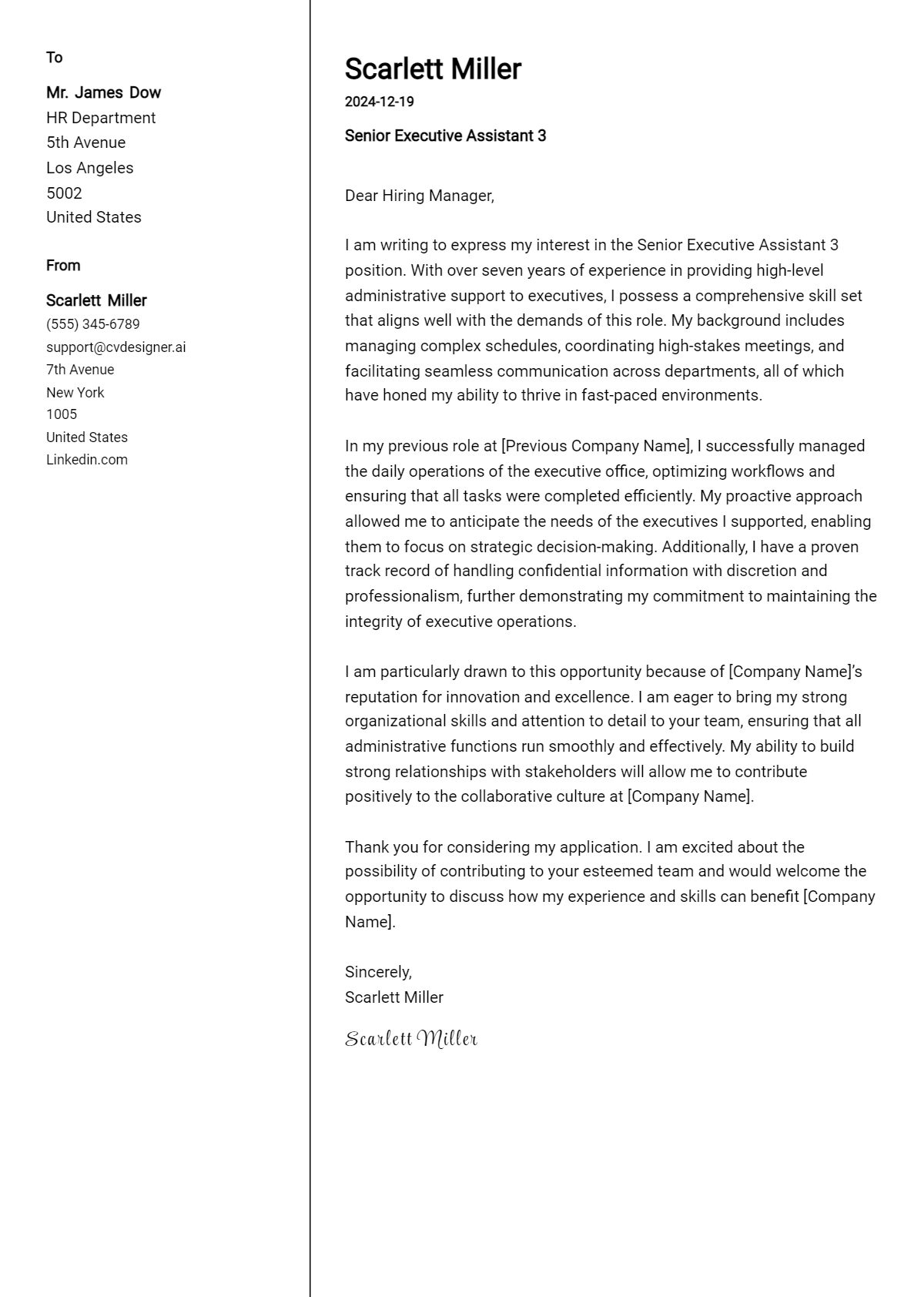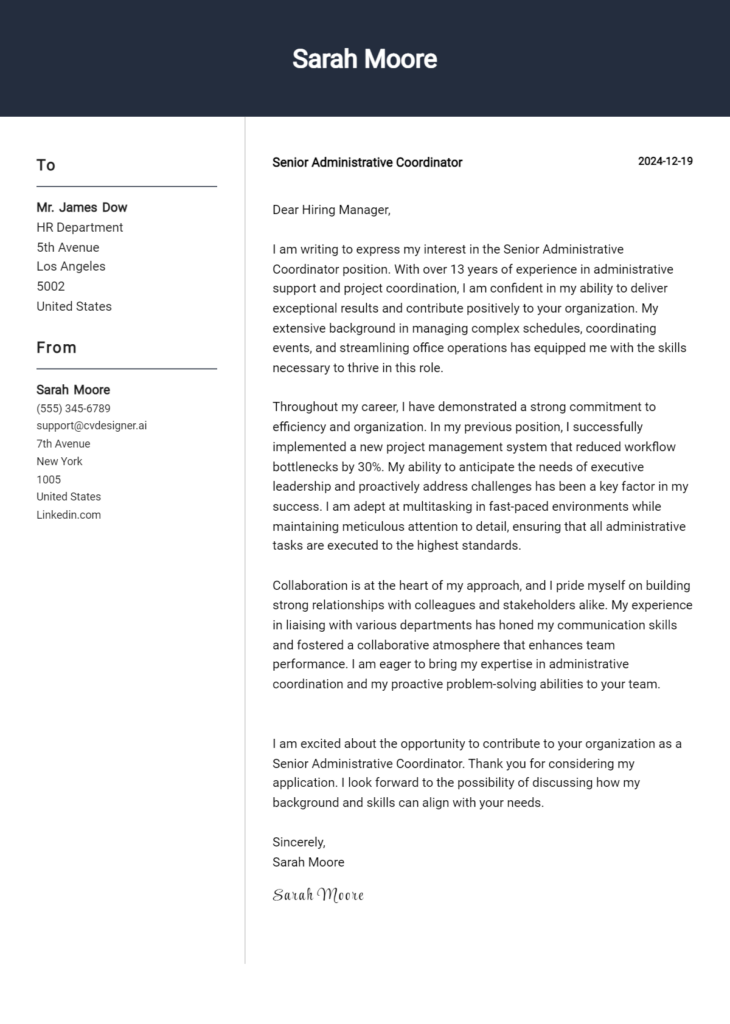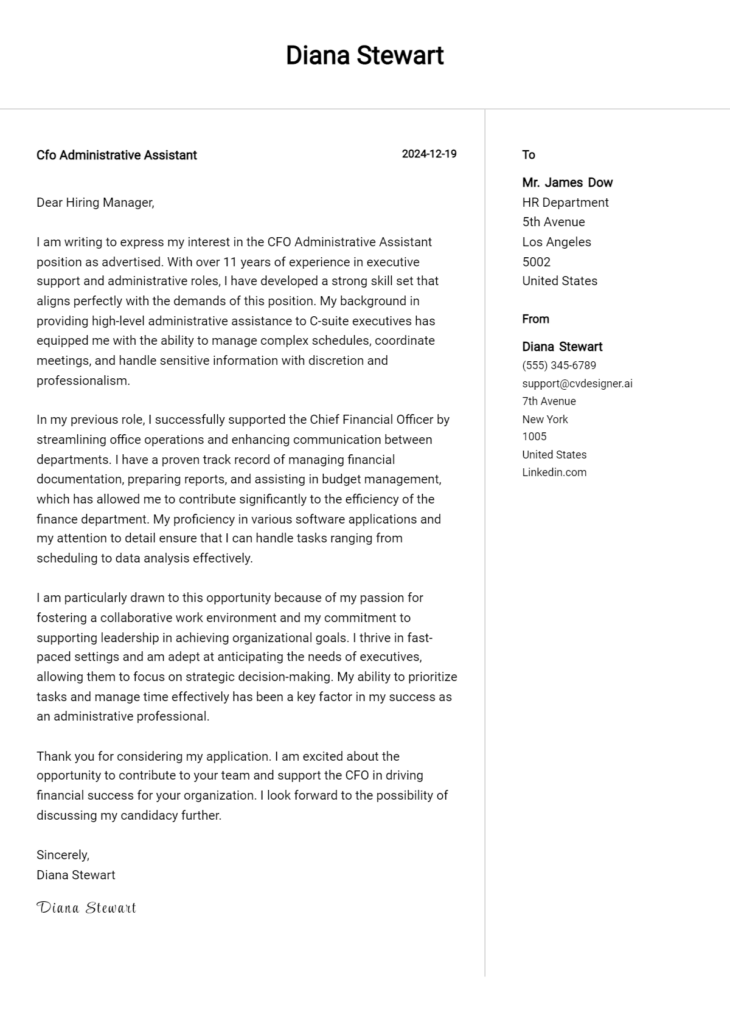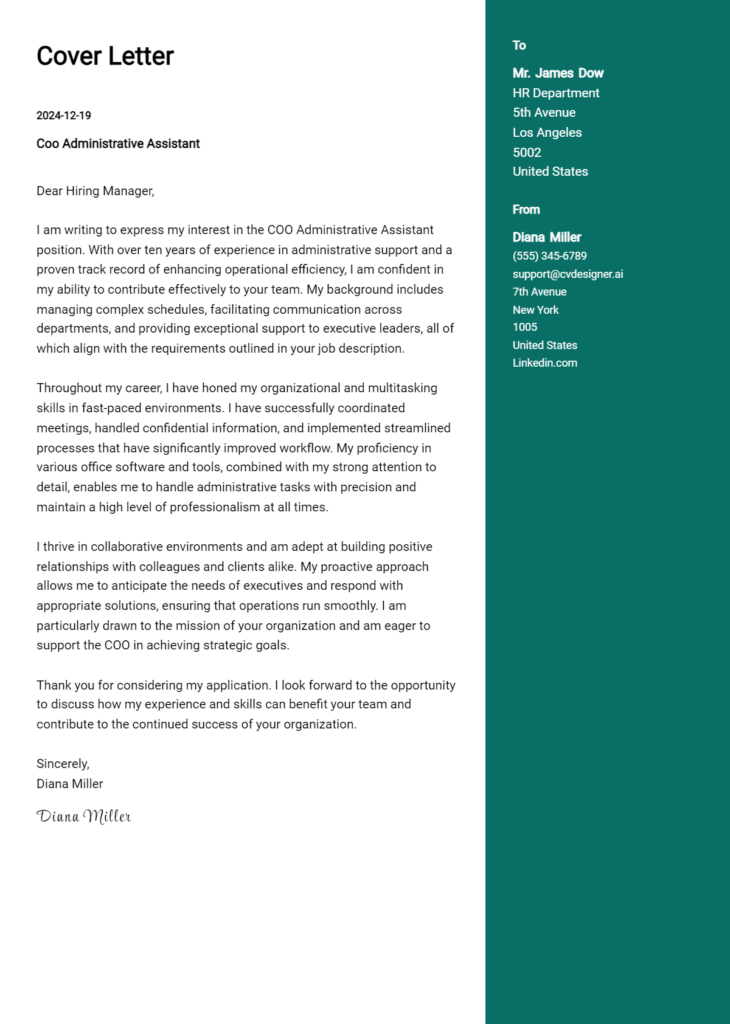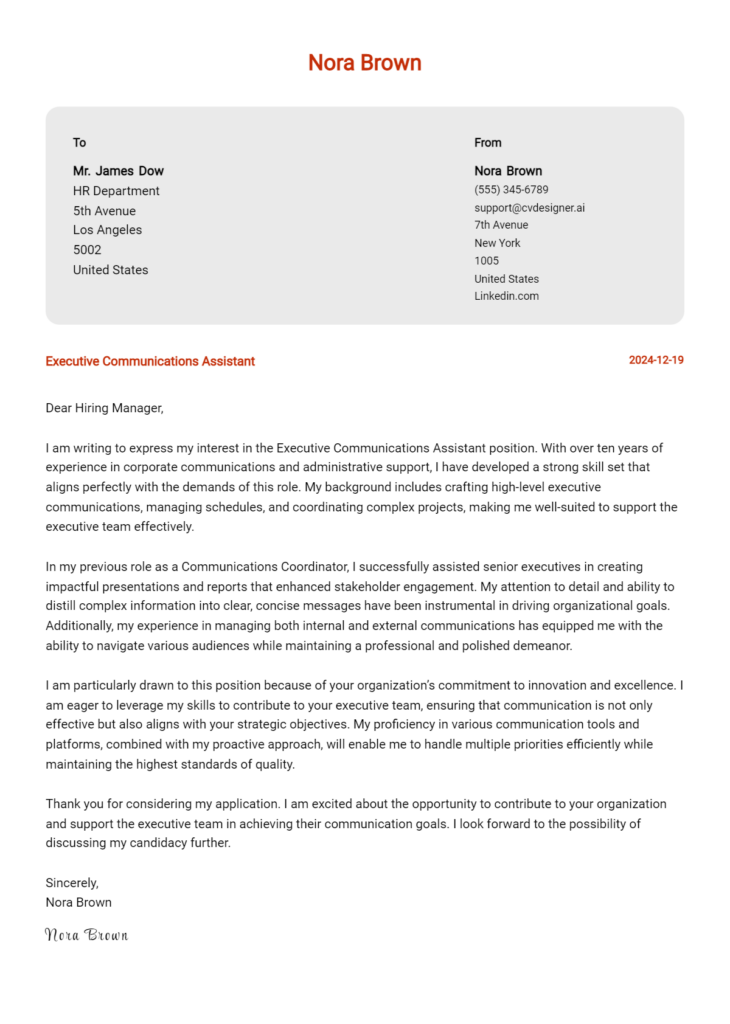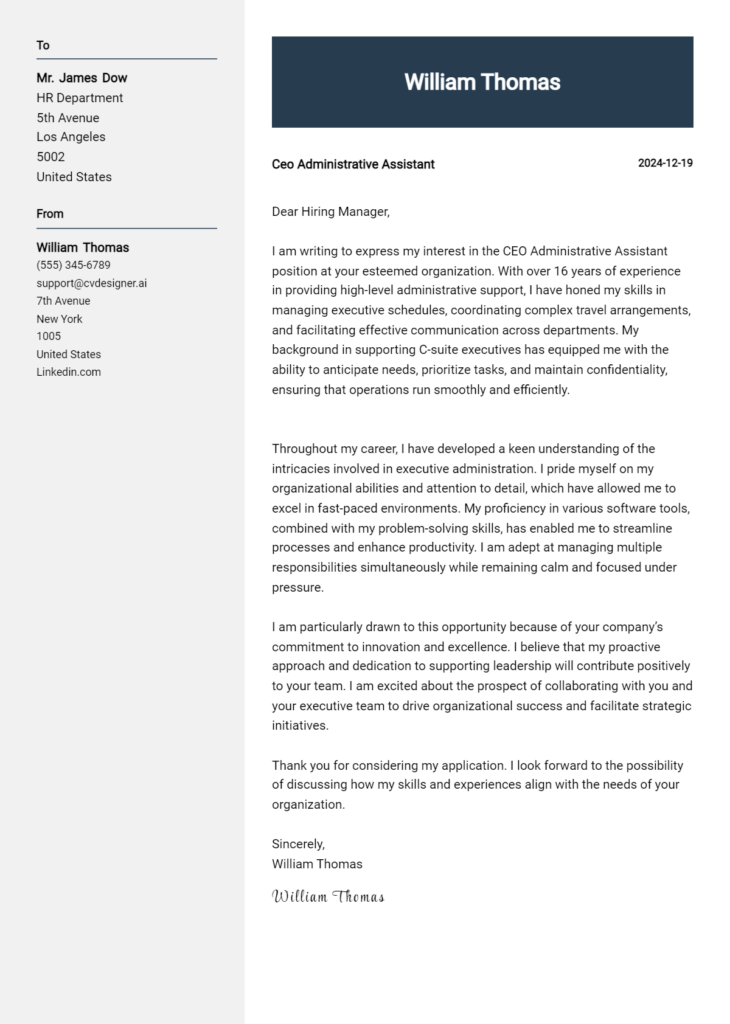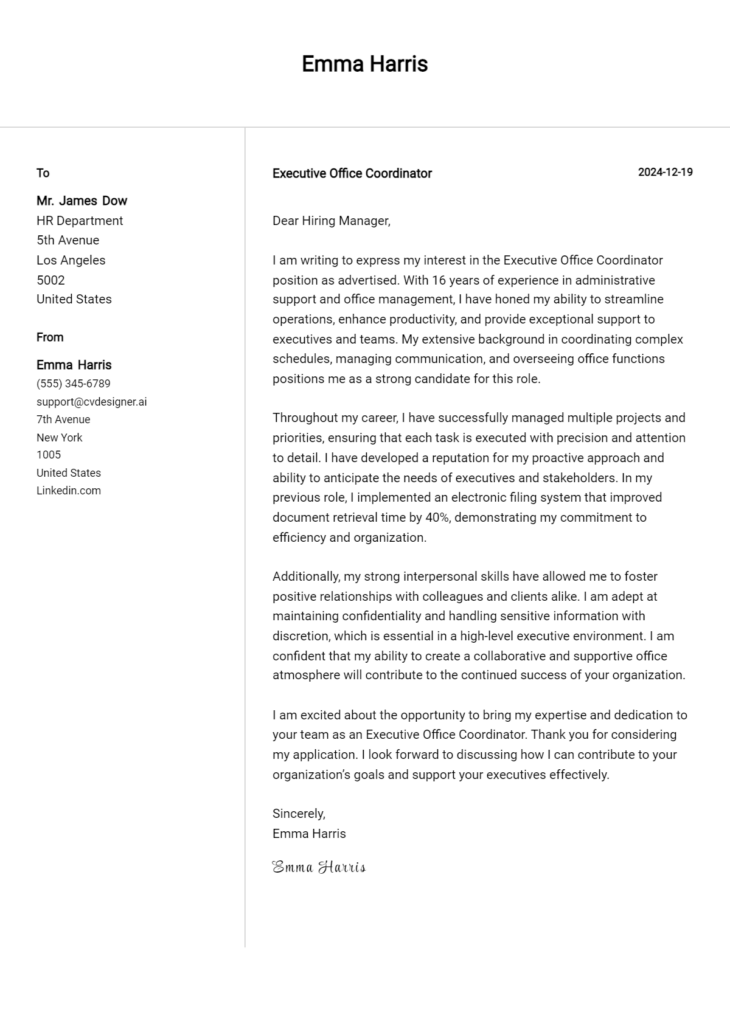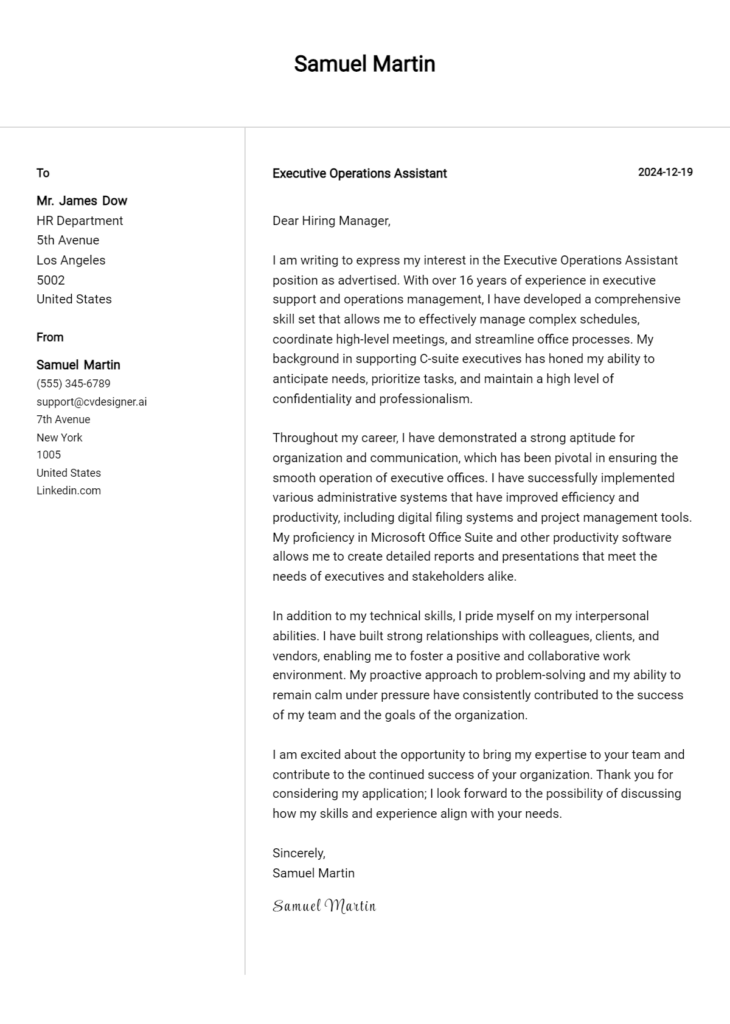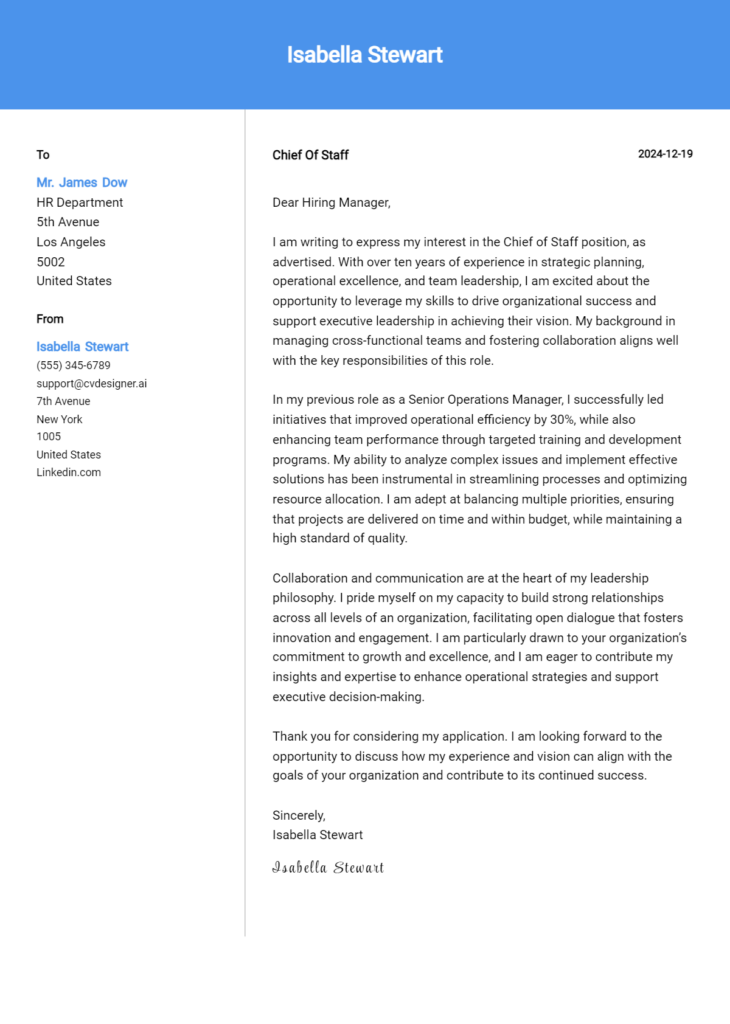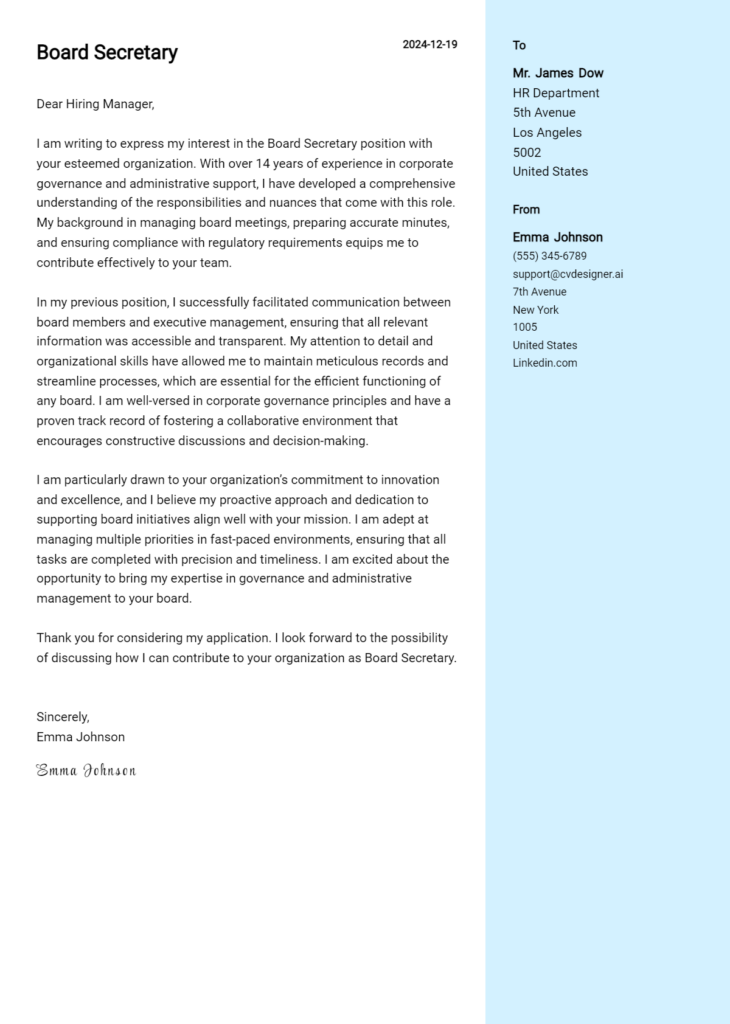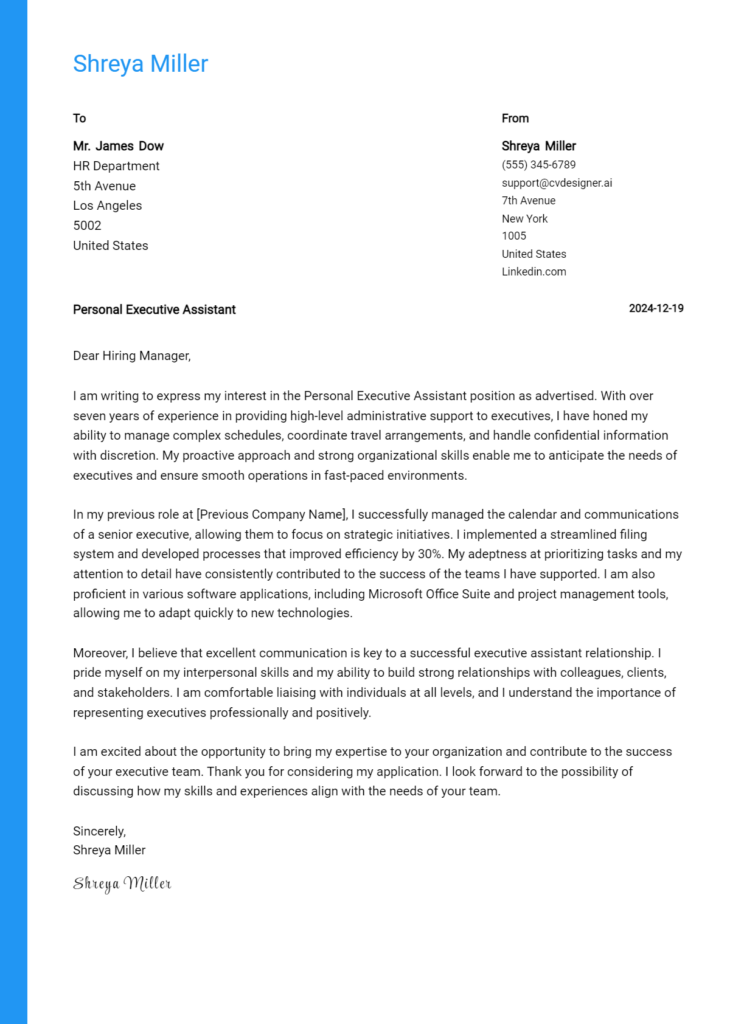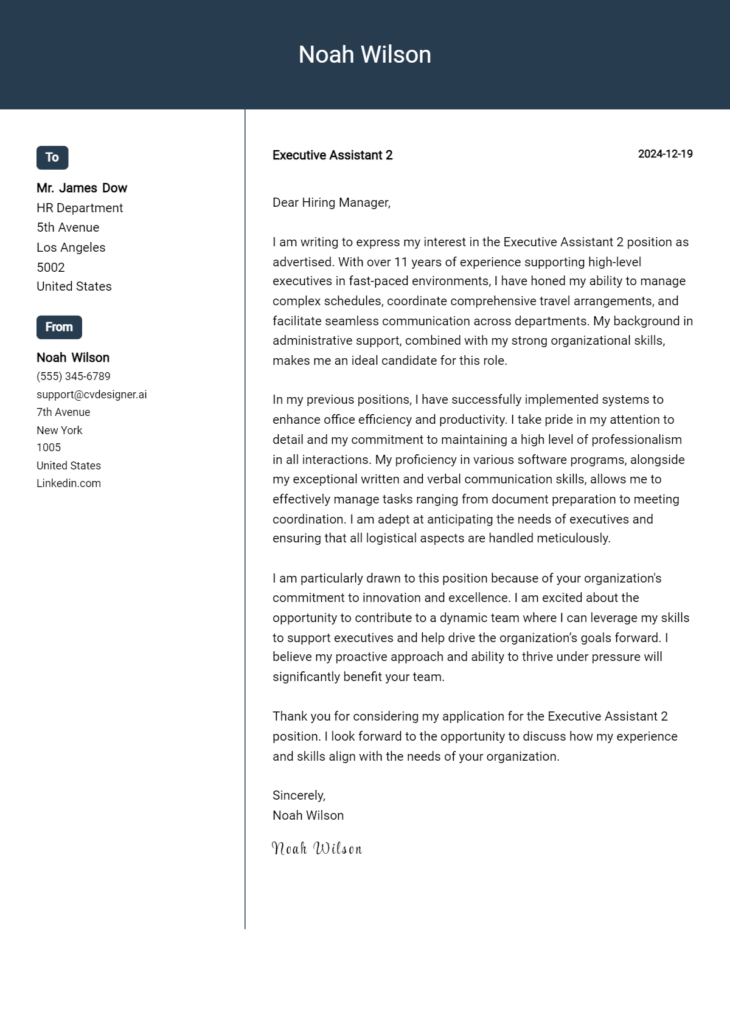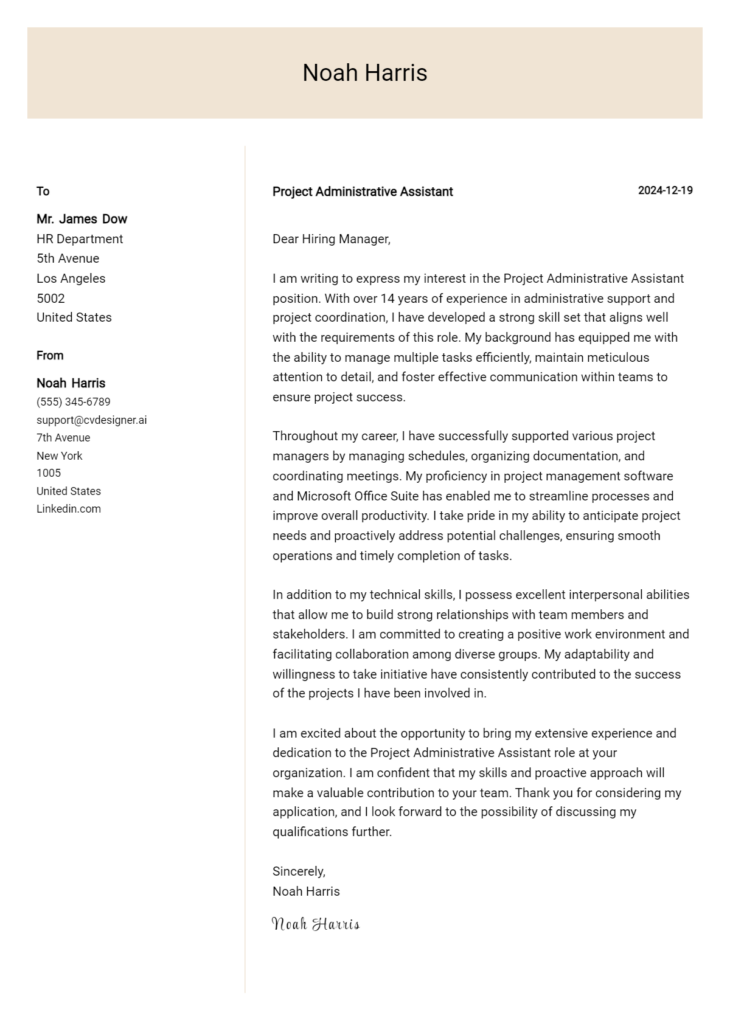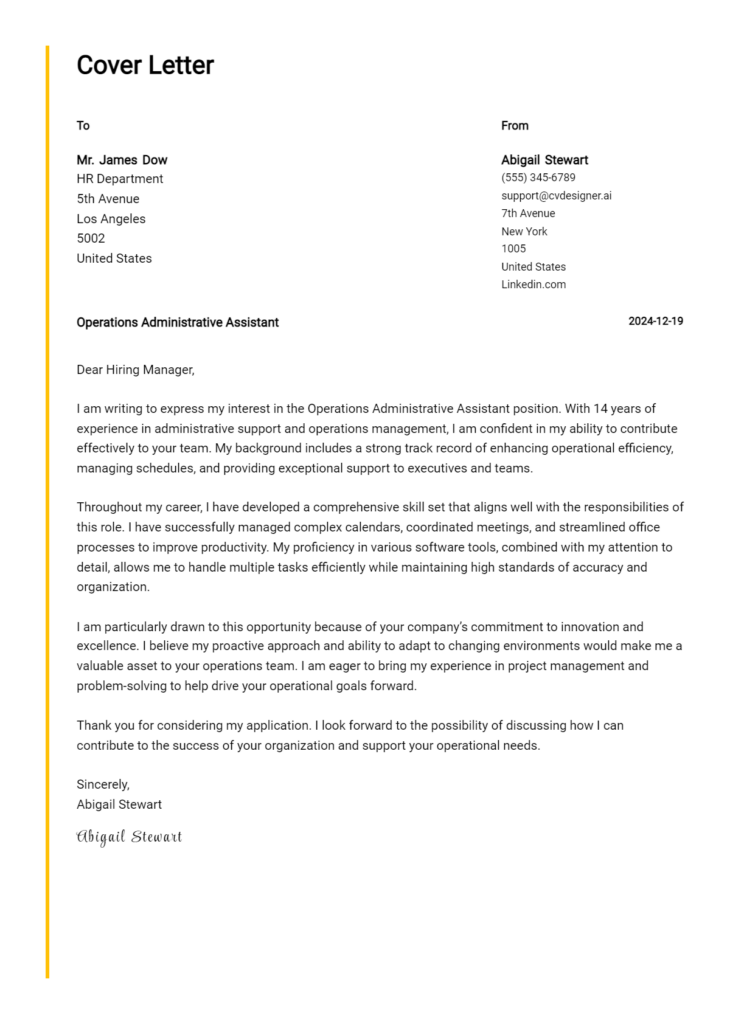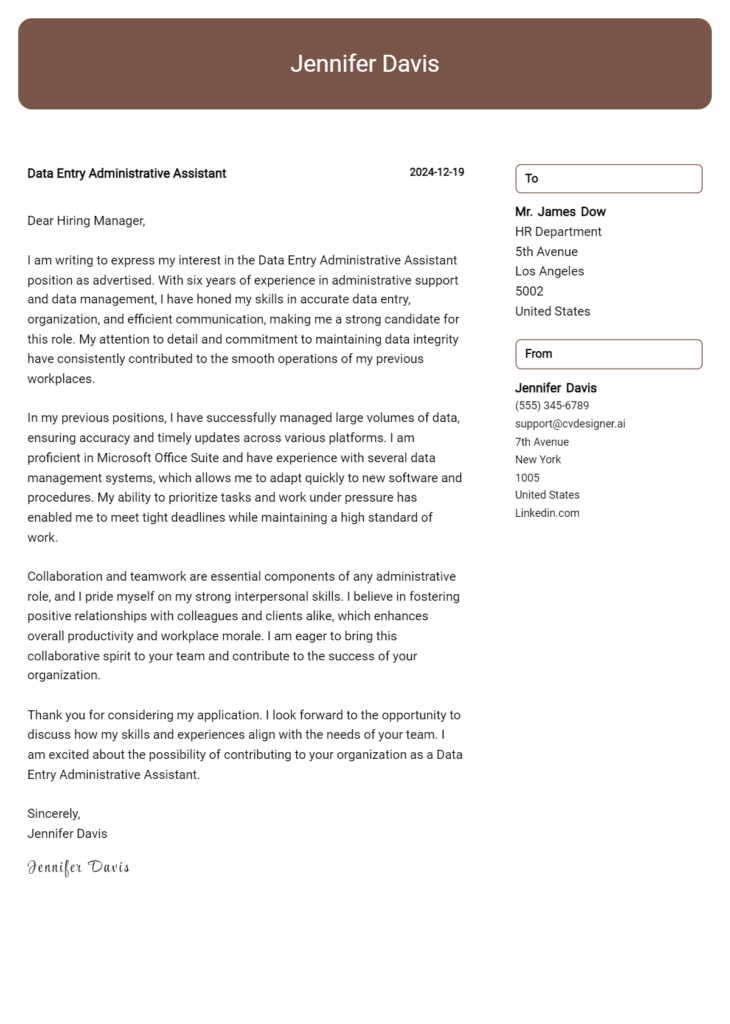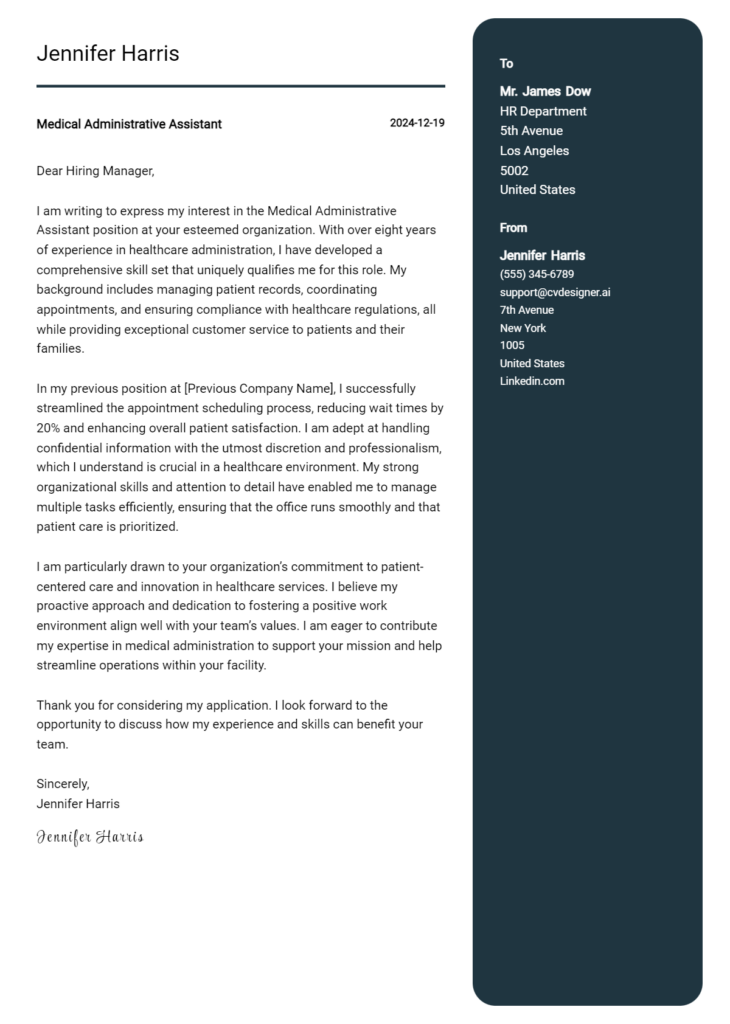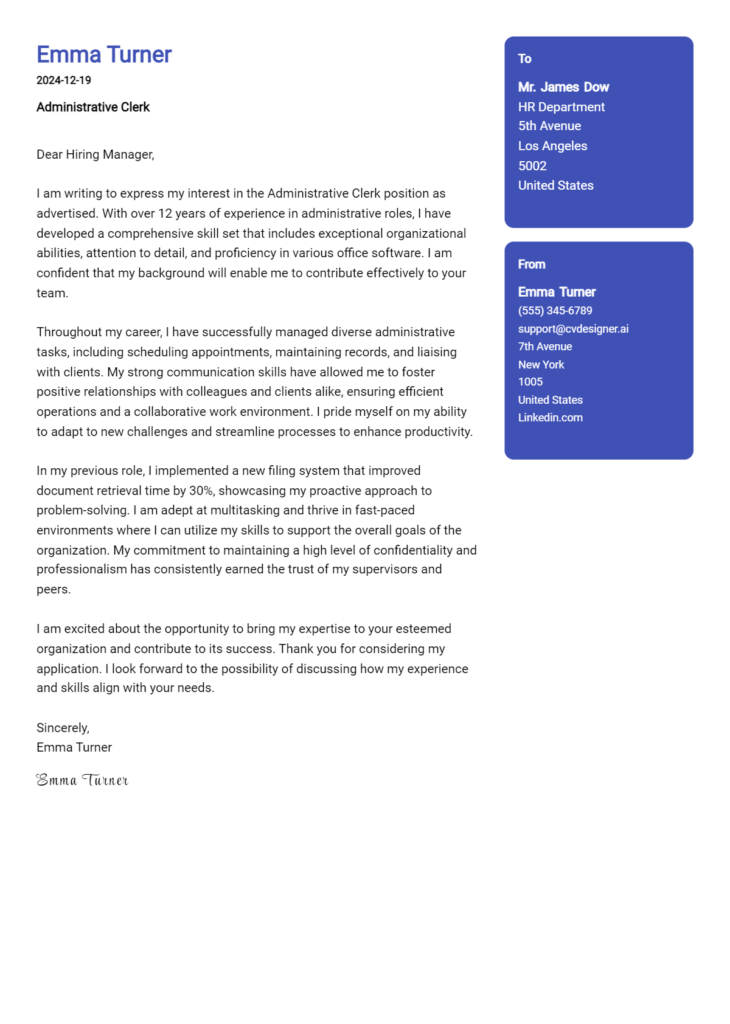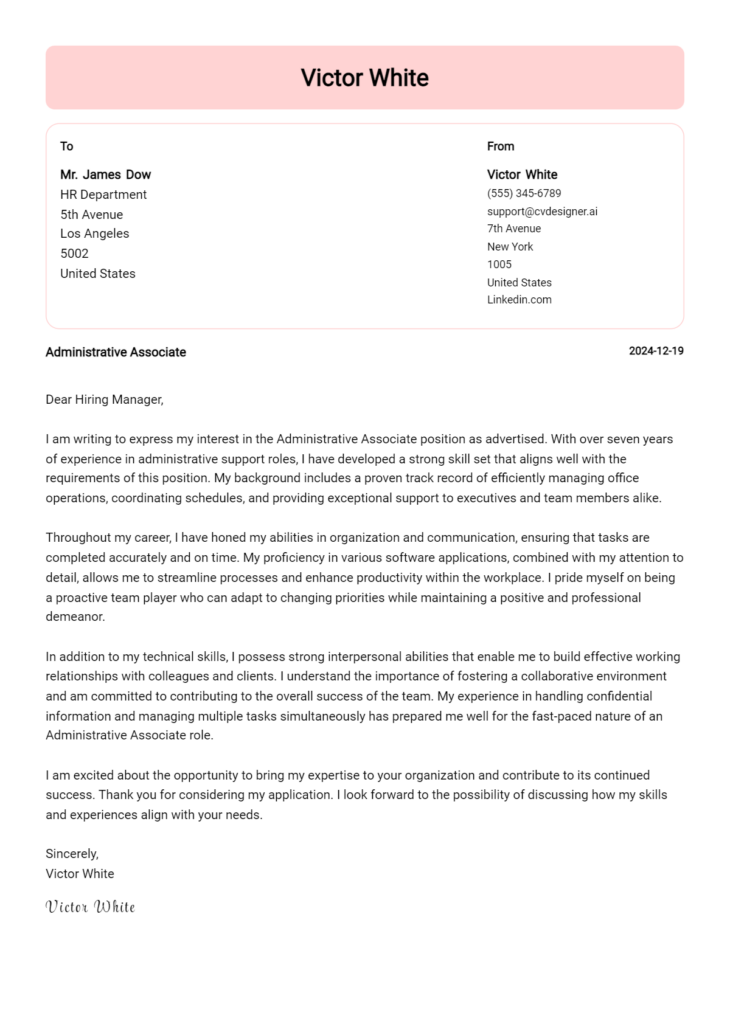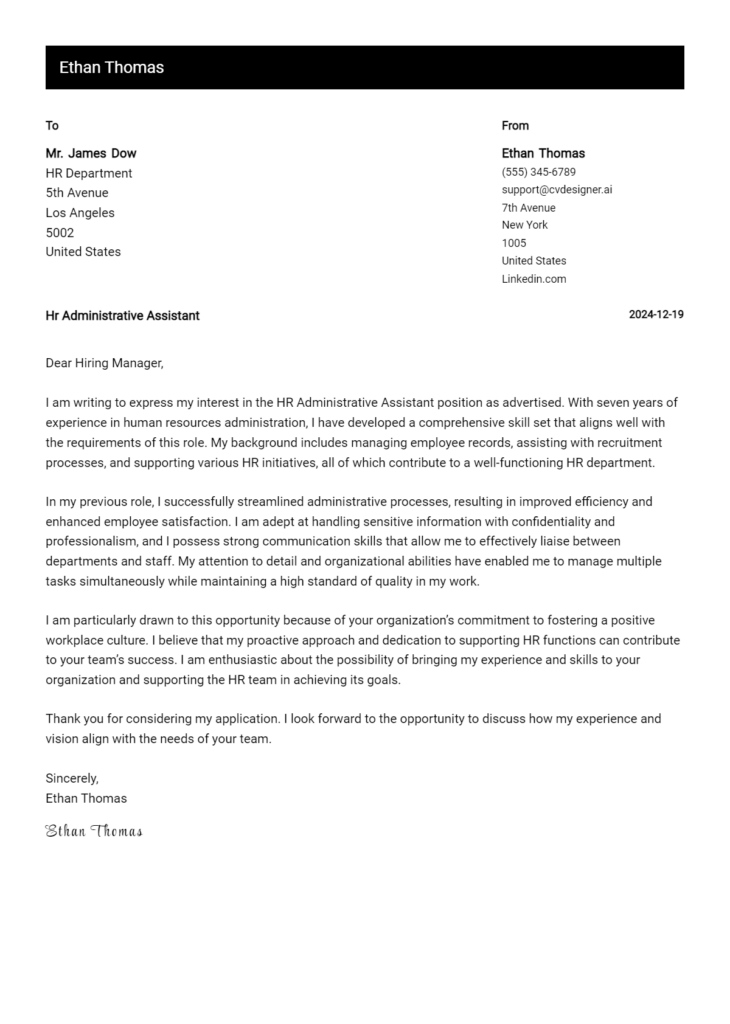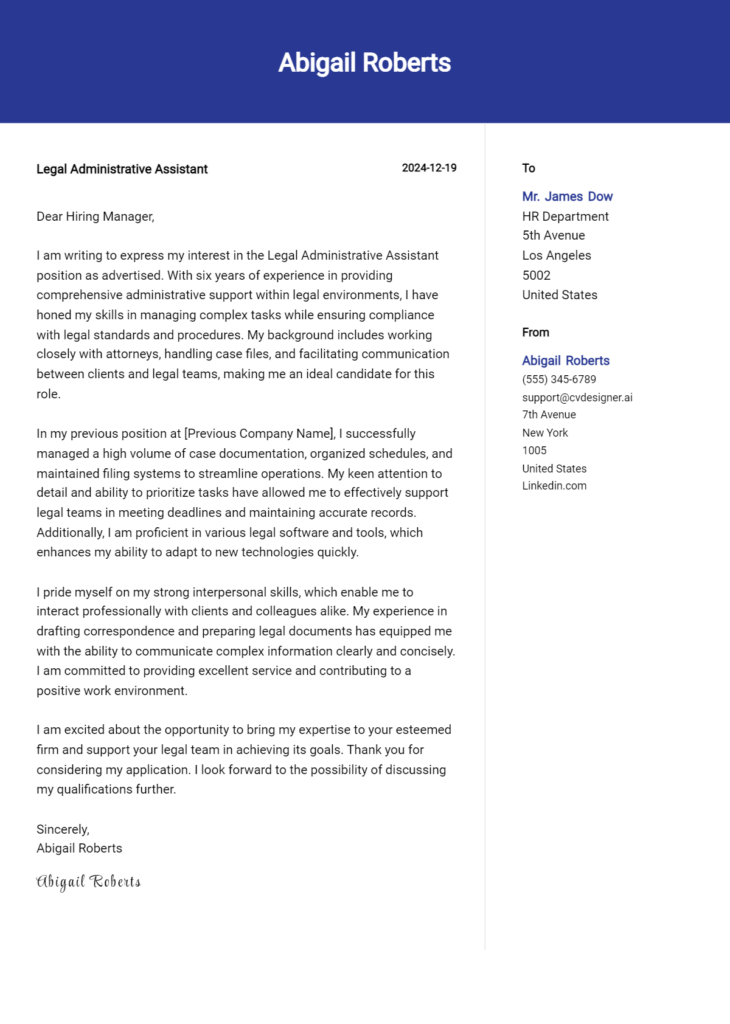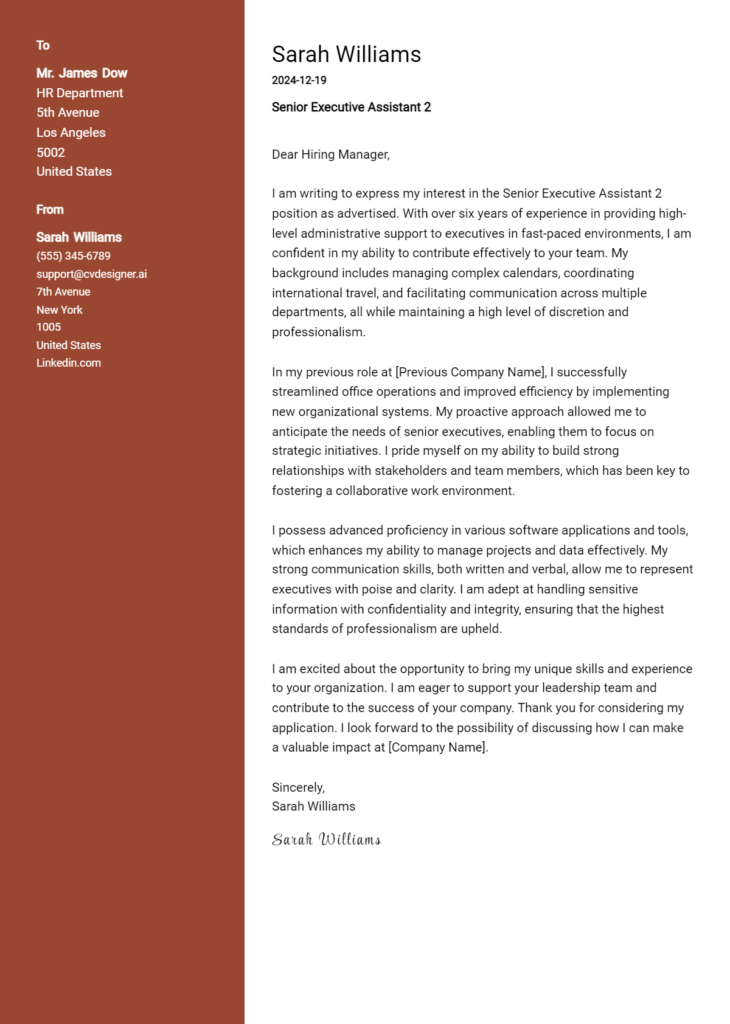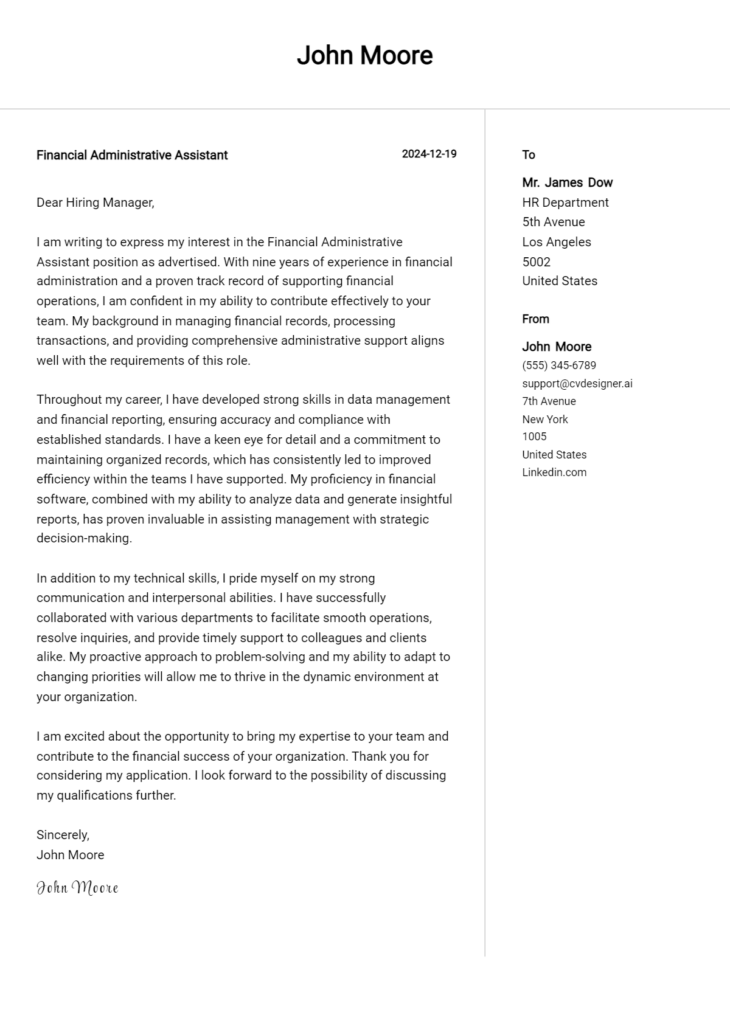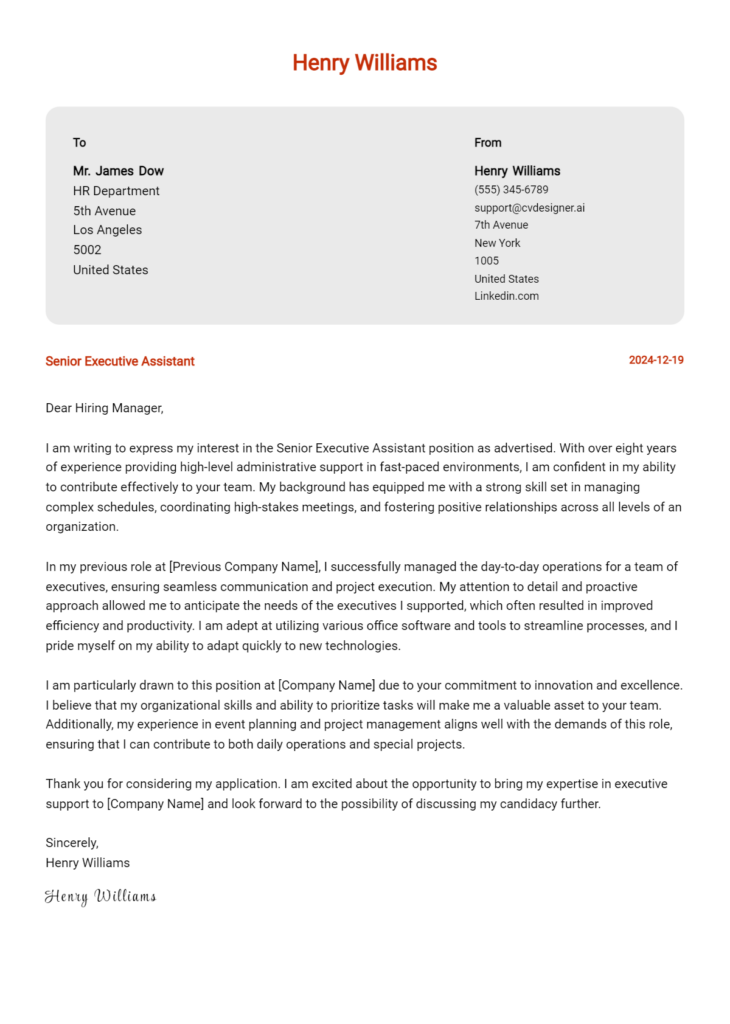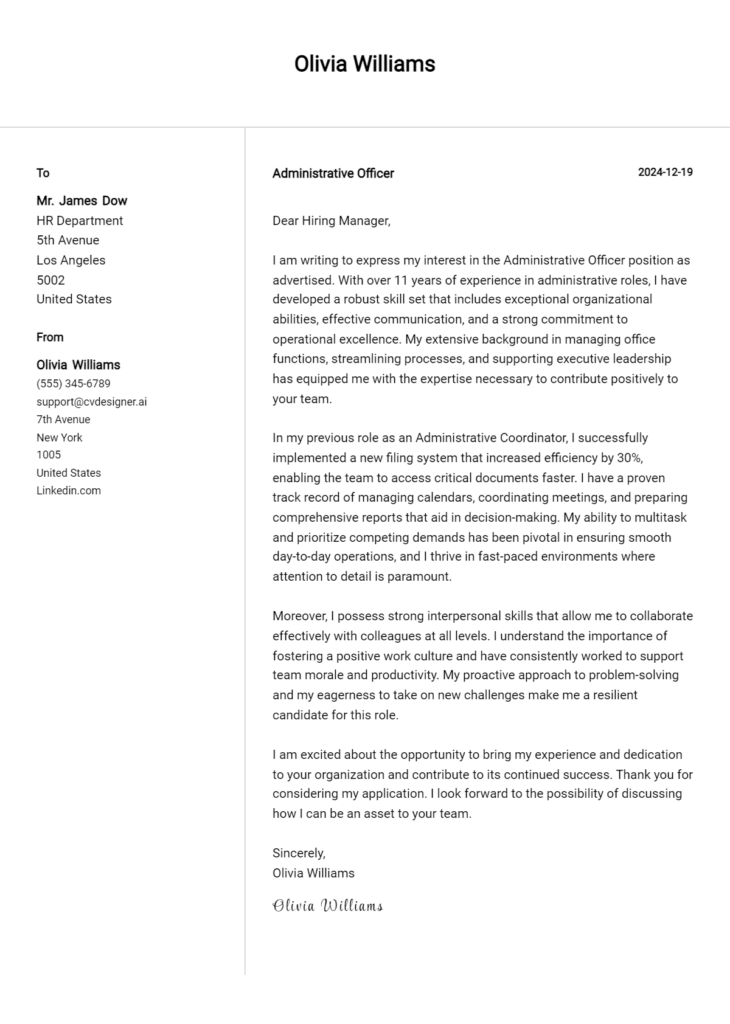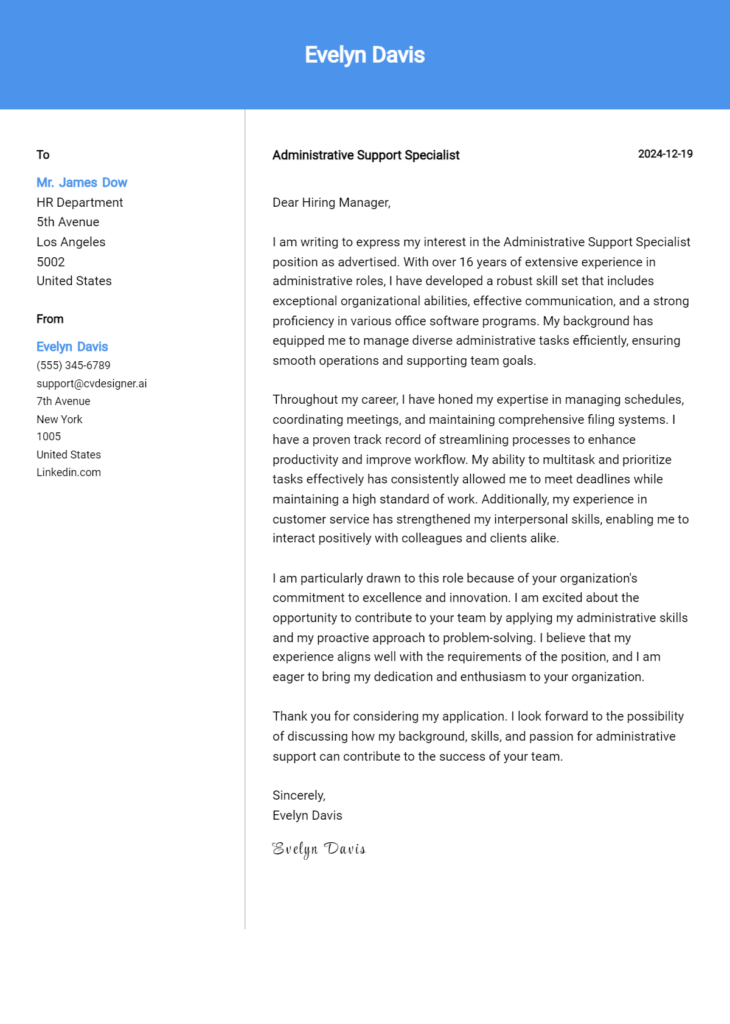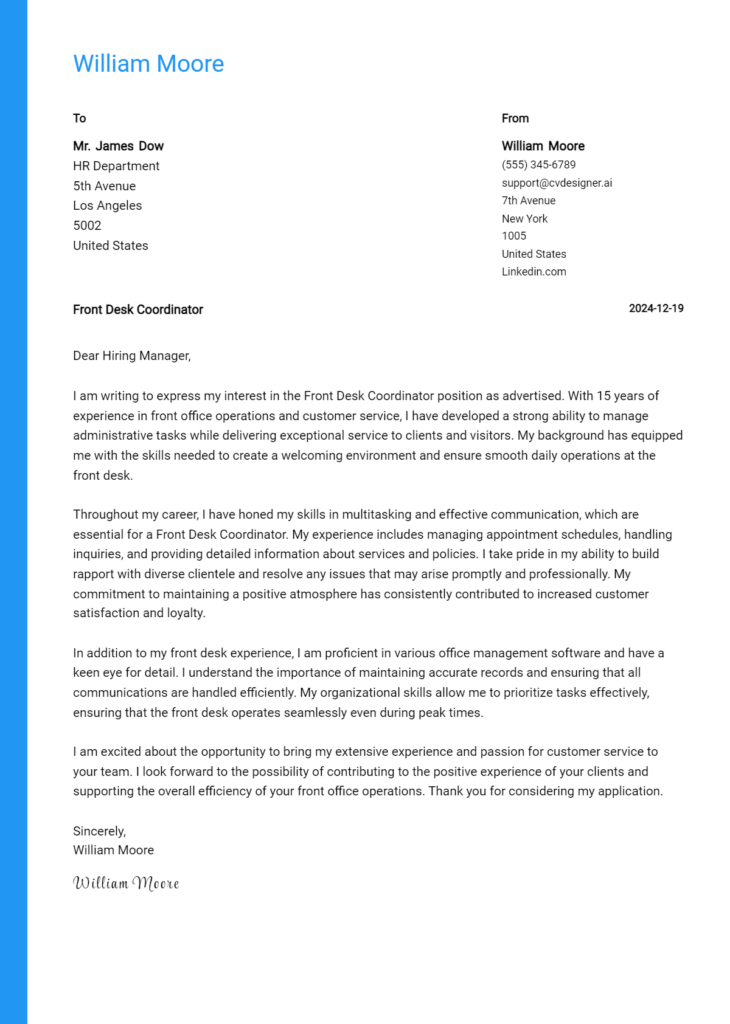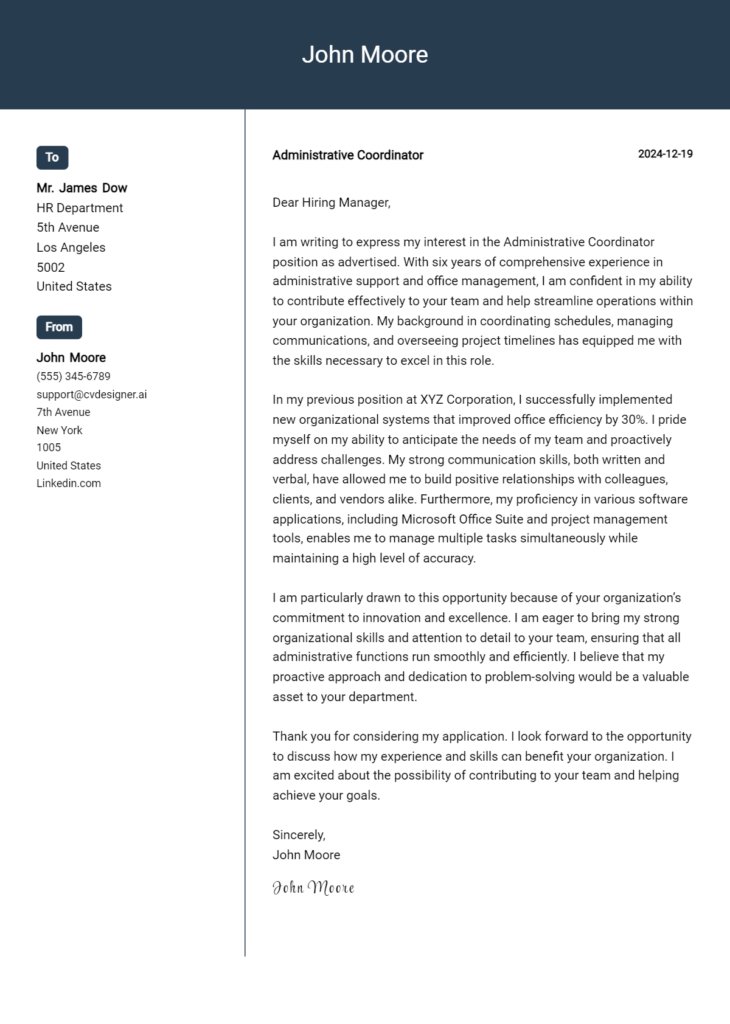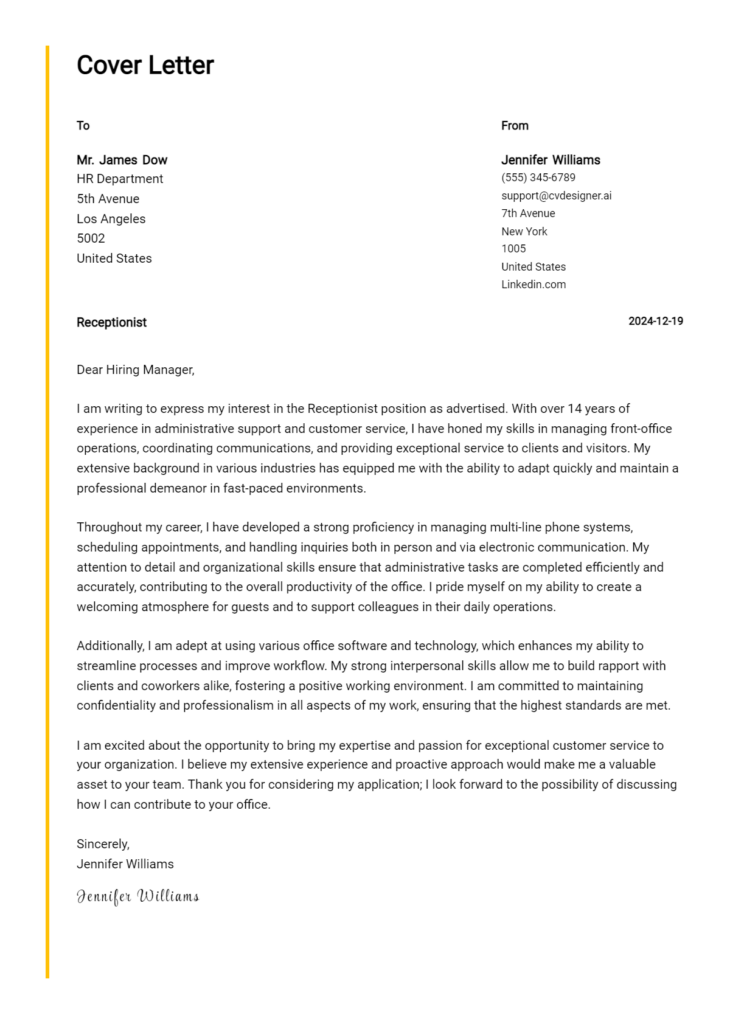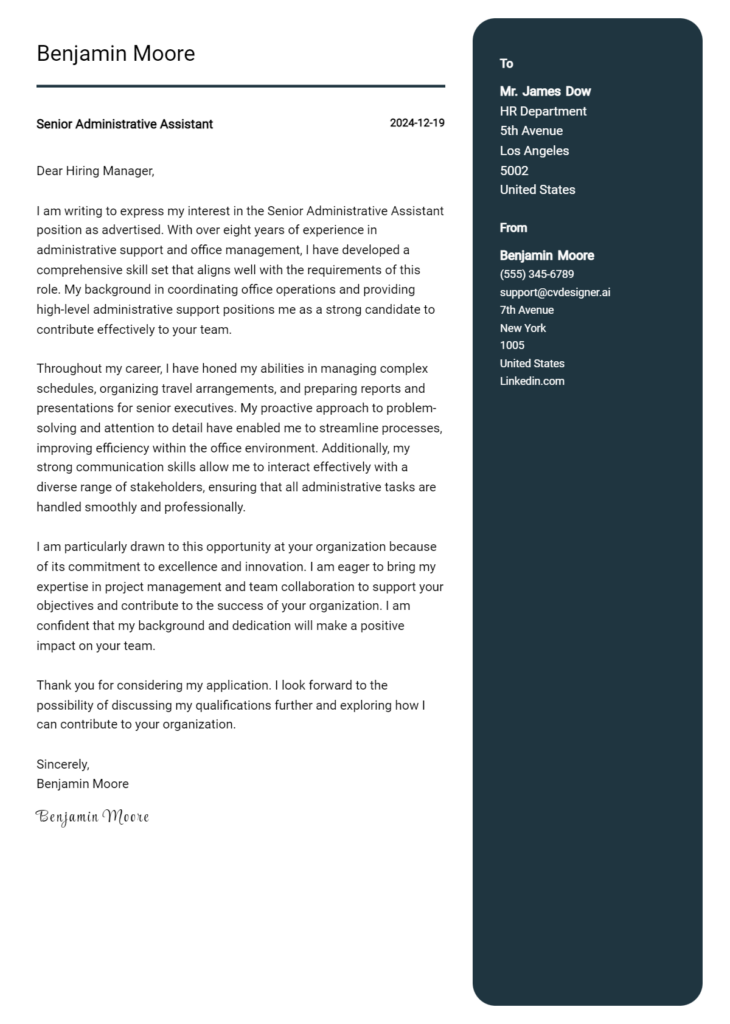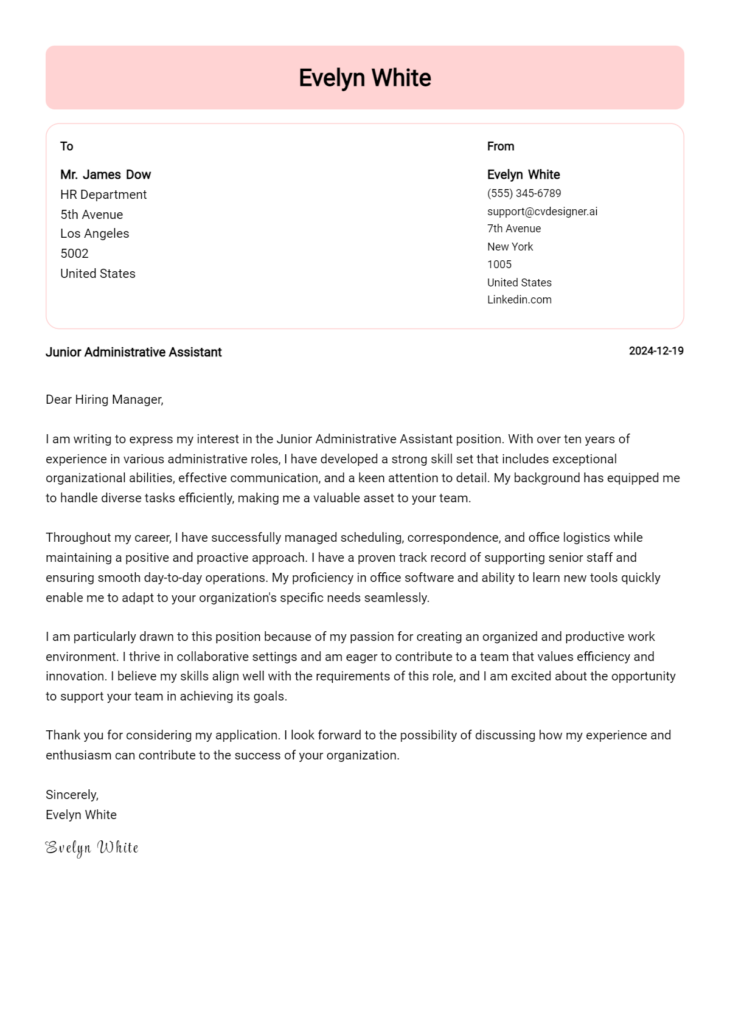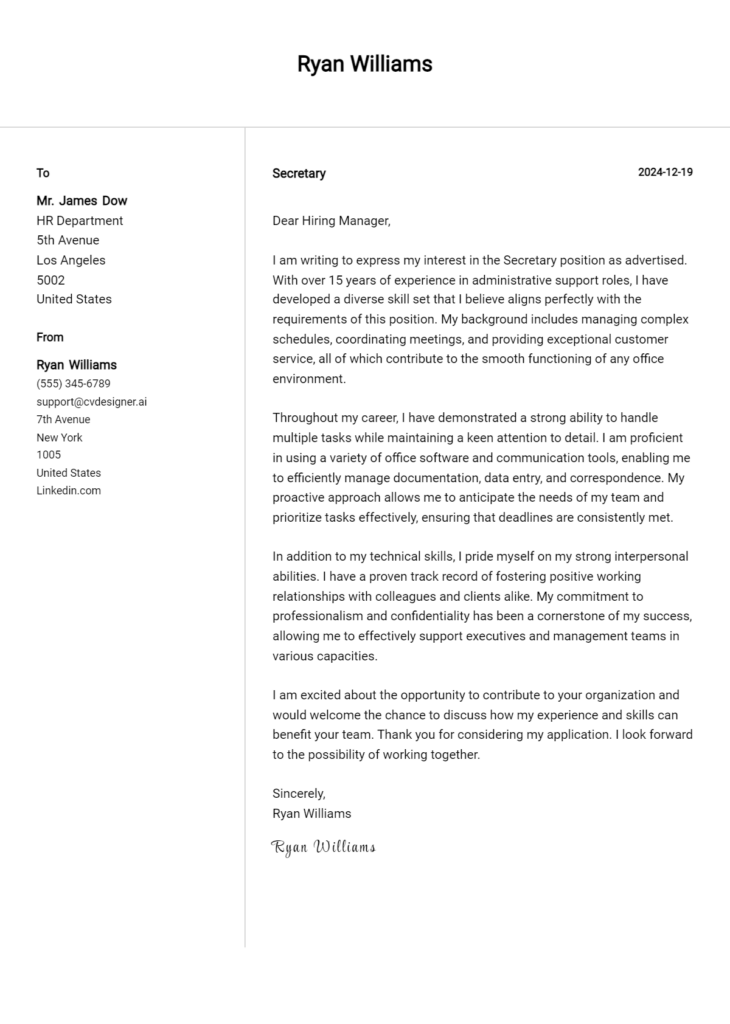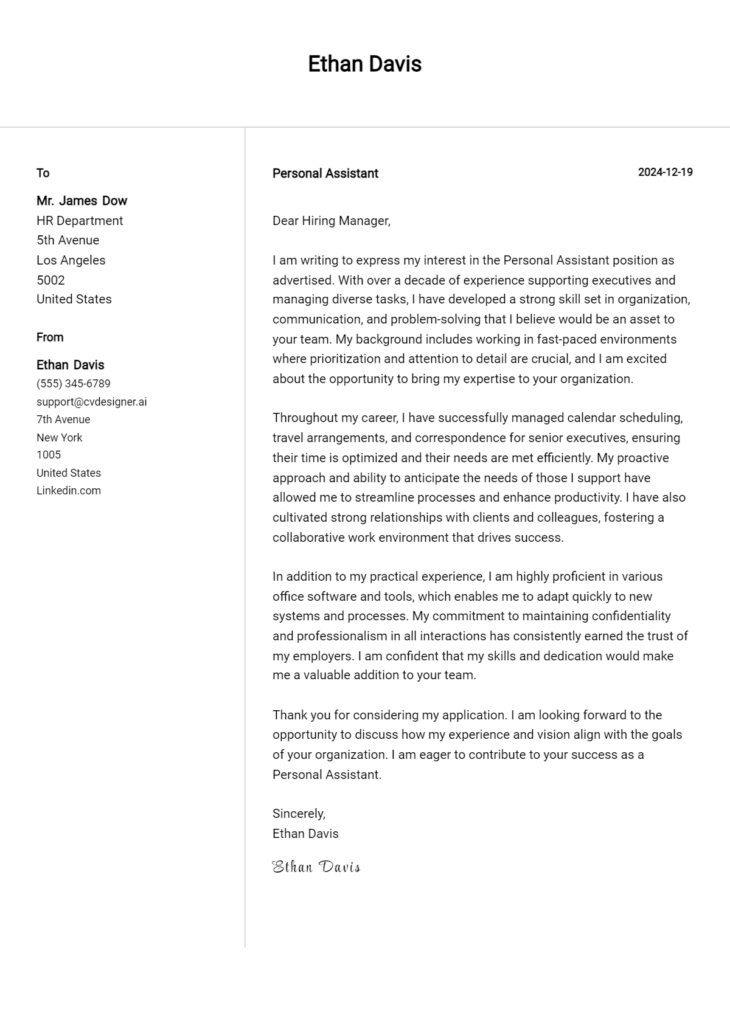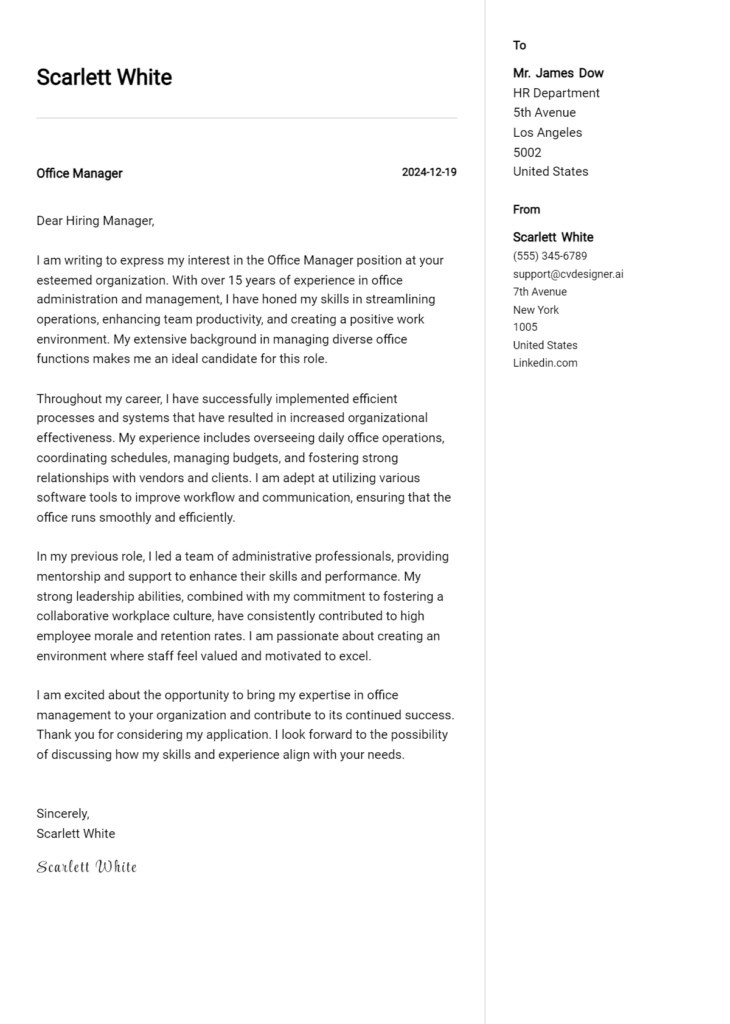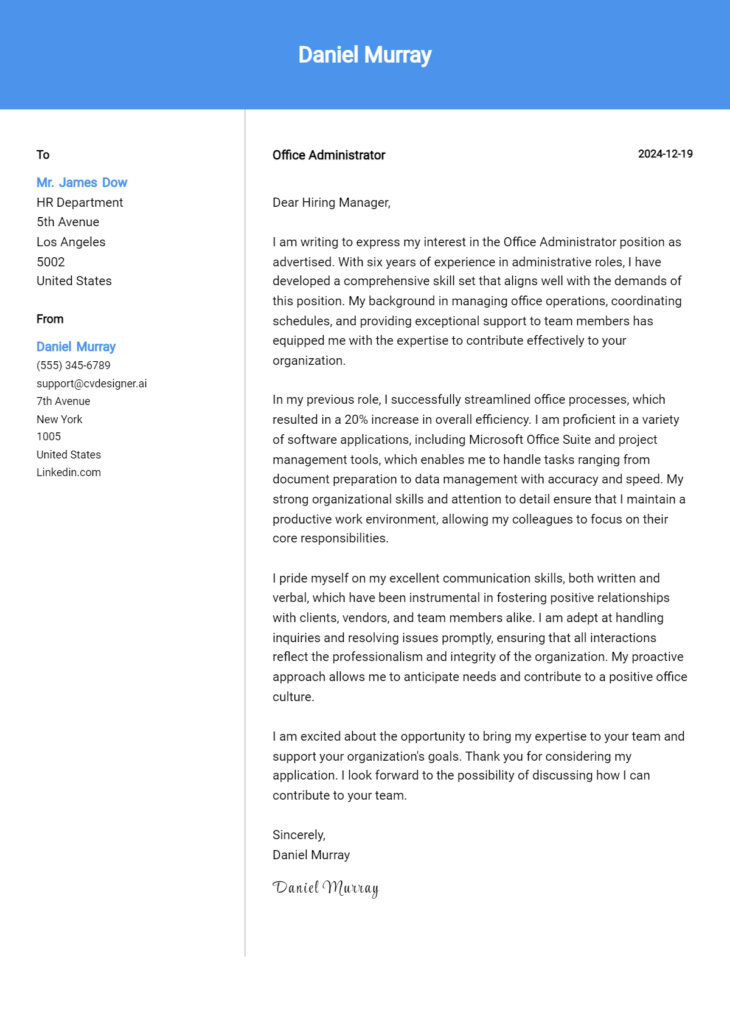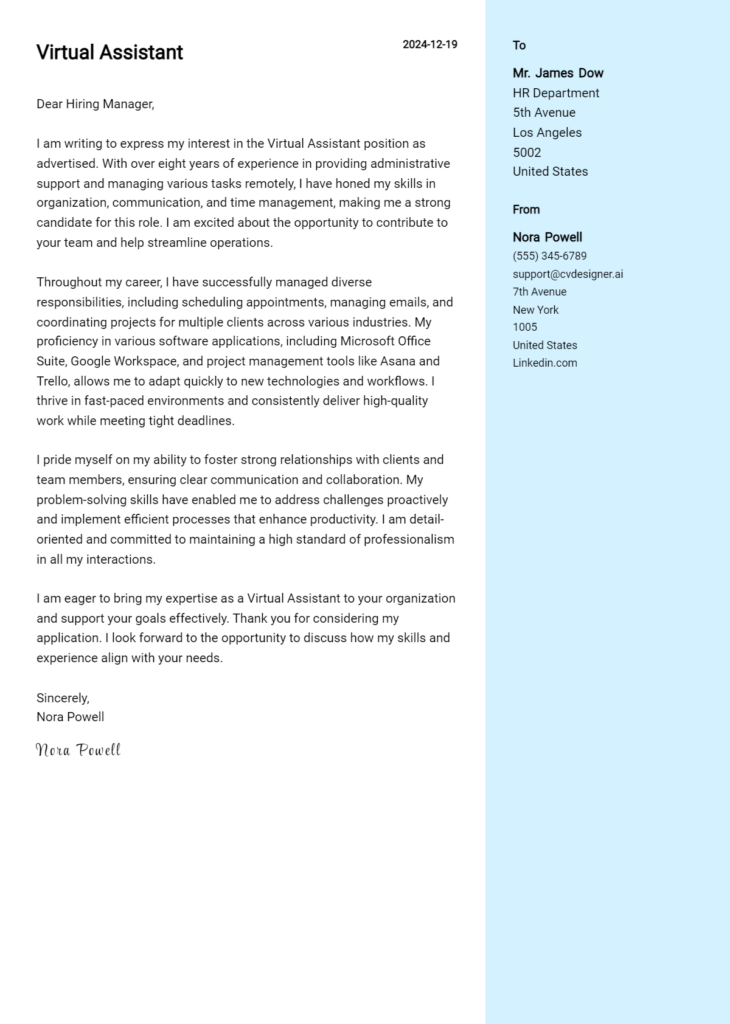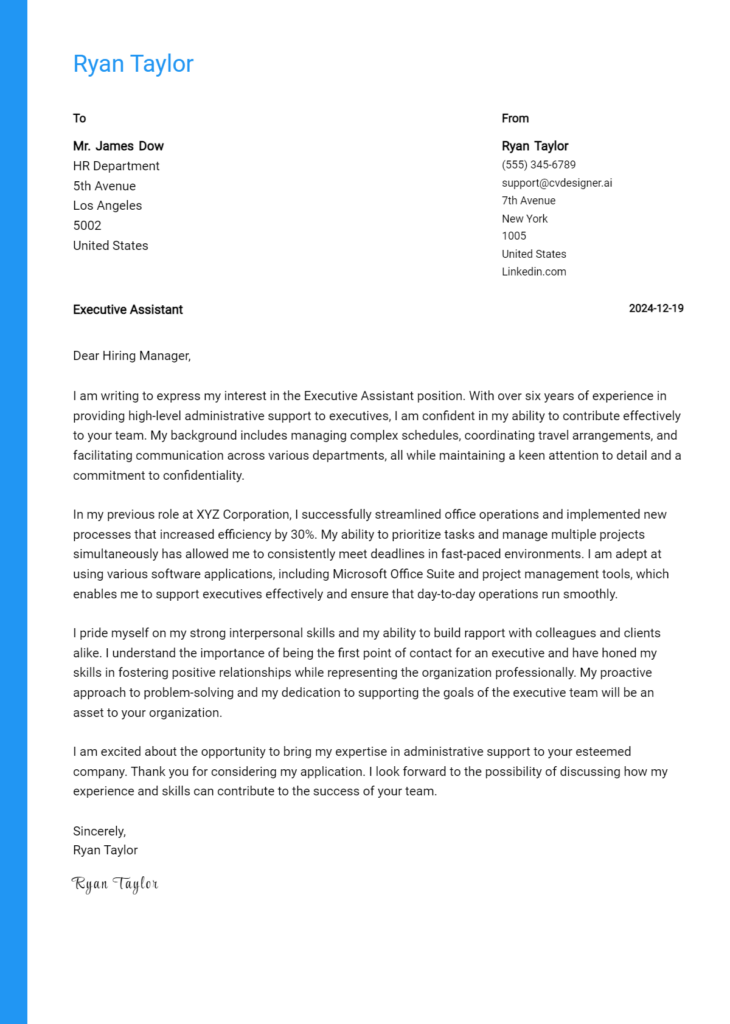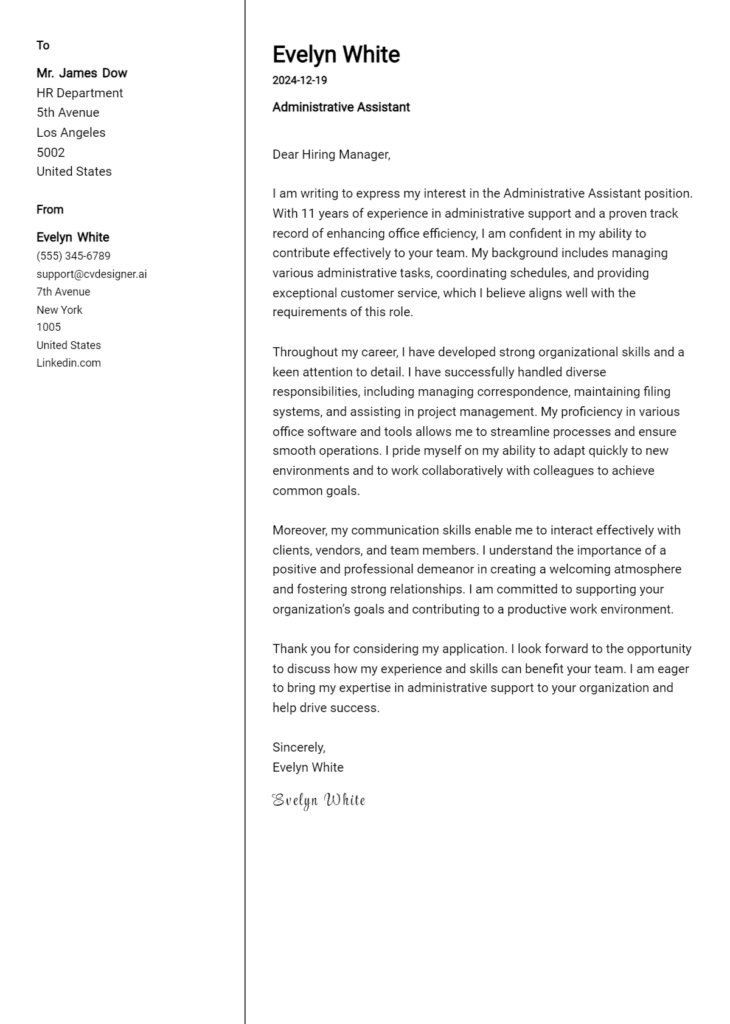Senior Executive Assistant 3 Cover Letter Examples
Explore additional Senior Executive Assistant 3 cover letter samples and guides and see what works for your level of experience or role.
How to Format a Senior Executive Assistant Cover Letter?
Crafting a well-structured cover letter is essential for a Senior Executive Assistant role, as it reflects your organizational skills and ability to communicate effectively. The way you format your cover letter can create a strong first impression, showcasing your professionalism and attention to detail—traits that are critical in supporting senior executives. A polished cover letter not only highlights your qualifications but also serves as a reflection of your capability to manage tasks efficiently and maintain a high standard of work.
In this guide, we'll delve into the key components of a professional cover letter, providing insights and examples tailored for Senior Executive Assistants to help you create a standout document.
We'll focus on the essential components of a professional cover letter, including:
- Cover Letter Header
- Cover Letter Greeting
- Cover Letter Introduction
- Cover Letter Body
- Cover Letter Closing
Each section is crucial in emphasizing your qualifications and professional demeanor. Let’s explore how to elevate your Senior Executive Assistant cover letter.
The Importance of a Cover Letter Header for a Senior Executive Assistant
A well-structured cover letter header is crucial for a Senior Executive Assistant position, as it sets the tone for professionalism and attention to detail. The header should include your contact information, the date, and the recipient's details, ensuring clarity and easy identification for the reader. A clear and professional header not only conveys your organizational skills but also reflects your understanding of business communication standards, which are essential in supporting executive-level personnel.
Strong Example
John Doe 123 Main Street City, State, ZIP john.doe@email.com (123) 456-7890 October 1, 2023 Jane Smith Director of Operations Company Name 456 Corporate Avenue City, State, ZIP
Weak Example
JD Email: johndoe@email.com 10/1/23 To Whom It May Concern
The Importance of the Cover Letter Greeting
The greeting of a cover letter is crucial as it sets the tone for the entire document. A well-crafted greeting demonstrates professionalism and shows that you have taken the time to personalize your application. By addressing the hiring manager directly, you create an immediate connection and convey respect for their position. To make a strong impression, it’s essential to avoid generic greetings like "To Whom It May Concern." Instead, invest a little effort in researching the recipient's name, which can often be found on the company’s website or through LinkedIn. A personalized greeting not only reflects your initiative but also enhances your candidacy as a Senior Executive Assistant.
Strong Greeting Example:
Dear Ms. Johnson,
Weak Greeting Example:
To Whom It May Concern,
The Importance of a Compelling Cover Letter Introduction for a Senior Executive Assistant
A well-crafted cover letter introduction is crucial for a Senior Executive Assistant role as it serves as the first impression a candidate makes on the hiring manager. This introduction should not only capture attention but also convey genuine interest in the position while briefly highlighting key skills or notable achievements that align with the job requirements. A strong introduction sets the tone for the rest of the cover letter, establishing the candidate as a capable and enthusiastic applicant. Below are examples of both strong and weak introductions to illustrate how impactful this section can be.
Strong Example
Dear [Hiring Manager's Name], As a seasoned Executive Assistant with over eight years of experience supporting C-level executives, I am excited to apply for the Senior Executive Assistant position at [Company Name]. My proven track record in managing complex schedules, coordinating high-stakes meetings, and implementing efficient administrative processes aligns perfectly with your team's needs. I am particularly drawn to [Company Name] because of its commitment to innovation and excellence, and I am eager to contribute my skills to support your executive team in achieving strategic goals.
Weak Example
To Whom It May Concern, I am writing to apply for the Senior Executive Assistant position. I have worked in administrative roles before and think I would be a good fit for your company. I can do many tasks and would like to help your team.
Purpose of the Cover Letter Body for a Senior Executive Assistant
The cover letter body for a Senior Executive Assistant serves as a critical platform for candidates to articulate their skills, experiences, and the unique value they bring to the organization. It is an opportunity to showcase relevant accomplishments that demonstrate their ability to effectively support executives and manage complex tasks. By highlighting specific projects, such as successfully coordinating high-stakes meetings, managing budgets, or implementing innovative office solutions, candidates can provide tangible evidence of their capabilities. This section is crucial for making a strong first impression and establishing how the candidate aligns with the company's goals and needs.
Strong Example
In my previous role at XYZ Corporation, I successfully managed the logistics for an international conference that brought together over 500 attendees and included senior executives from multiple countries. This project required meticulous planning, budget management, and the ability to coordinate across various departments. As a result, the event not only stayed within budget but also received outstanding feedback from participants, enhancing the company’s reputation in the industry. Additionally, I implemented a new digital filing system that reduced document retrieval time by 40%, significantly improving office efficiency.
Weak Example
I have worked as an executive assistant for several years and have done many tasks. I can handle emails and schedule meetings. I think I am good at my job, and I hope to contribute to your company in a positive way. I have also helped with some events, but I don't remember the details.
Importance of Cover Letter Closing for a Senior Executive Assistant
The closing paragraph of a cover letter is crucial as it leaves a lasting impression on the hiring manager. It serves to summarize the applicant's qualifications, reiterate their enthusiasm for the position, and encourage the next steps, such as reviewing the resume or scheduling an interview. A strong closing can reinforce the candidate's fit for the role, while a weak one may undermine their overall message.
Strong Example
Thank you for considering my application for the Senior Executive Assistant position. With over seven years of experience managing executive schedules, coordinating high-level meetings, and enhancing office efficiency, I am excited about the opportunity to contribute to your team. I am particularly drawn to your organization's commitment to innovation and excellence. I would love the chance to discuss how my skills can benefit your executive team. I look forward to the possibility of scheduling an interview to further explore this opportunity.
Weak Example
Thanks for reading my cover letter. I think I would be okay at the Senior Executive Assistant job. Please look at my resume. I hope to hear back from you soon.
These tips will assist candidates in crafting an effective cover letter tailored for the Senior Executive Assistant role. A well-written cover letter should not only highlight your technical skills and problem-solving abilities but also demonstrate your understanding of the Software Development Life Cycle (SDLC), your capacity for teamwork, and your passion for continuous learning. By emphasizing these qualities, you can present yourself as a strong candidate ready to support high-level executives in a fast-paced environment.
Tips for Writing a Cover Letter for Senior Executive Assistant
Highlight Your Technical Skills
Emphasize your proficiency in software tools and platforms that are critical for a Senior Executive Assistant. Mention any experience with project management software, CRM systems, or advanced Microsoft Office Suite skills. Clearly outline how these technical skills have enhanced your efficiency and productivity in past roles.Showcase Problem-Solving Abilities
Provide specific examples of challenges you faced in previous positions and how you successfully addressed them. Use the STAR method (Situation, Task, Action, Result) to structure your examples. This approach not only illustrates your problem-solving skills but also highlights your ability to think critically under pressure.Demonstrate Knowledge of SDLC
If you have experience working closely with development teams or managing projects within the Software Development Life Cycle, be sure to mention this. Discuss how your understanding of SDLC has enabled you to effectively communicate with technical staff and manage project timelines, ensuring that all stakeholders are aligned.Emphasize Teamwork and Collaboration
Senior Executive Assistants often work with various departments and teams. Share instances where you successfully collaborated with others to achieve a common goal. Highlight your ability to navigate different personalities and work styles, emphasizing your adaptability and interpersonal skills.Express a Passion for Continuous Learning
Convey your eagerness to stay updated on industry trends and enhance your skill set. Mention any relevant courses, certifications, or workshops you have completed or are currently engaged in. This demonstrates to potential employers that you are committed to personal and professional growth, which is vital in a rapidly changing work environment.
For additional guidance, consider exploring cover letter templates or utilizing a cover letter builder to ensure your letter stands out.
Common Mistakes to Avoid in a Senior Executive Assistant Cover Letter
Avoiding common mistakes in your cover letter is crucial for making a strong first impression. A well-crafted cover letter can set you apart from other candidates vying for the Senior Executive Assistant position. Here are some common pitfalls to steer clear of:
Generic Greeting: Using a vague salutation like "To Whom It May Concern" can make your letter seem impersonal. Always try to address it to the specific hiring manager if possible.
Lack of Tailoring: Sending a one-size-fits-all cover letter can be detrimental. Customize your letter to reflect the job description and showcase how your skills align with the company's needs.
Overly Formal Language: While professionalism is key, using overly complex language can obscure your message. Aim for a conversational tone that still conveys your qualifications effectively.
Neglecting Achievements: Failing to highlight your accomplishments may cause you to miss out on showcasing your value. Use concrete examples to demonstrate how you’ve contributed to previous employers.
Ignoring Formatting Guidelines: Poor formatting can detract from your content. Follow a clear cover letter format that enhances readability and ensures your letter looks polished.
Typos and Grammatical Errors: Simple mistakes can undermine your professionalism. Always proofread your cover letter or have someone else review it to catch any errors.
Inadequate Closing Statement: A weak conclusion can leave a bad impression. End with a strong closing that reiterates your enthusiasm for the role and invites further discussion.
For more help, you can check out these cover letter examples to inspire your writing!
Cover Letter FAQs for Senior Executive Assistant
What should I include in my cover letter for a Senior Executive Assistant position?
In your cover letter, focus on showcasing your relevant skills and experiences that align with the role. Start with a strong introduction that specifies the position you're applying for. Highlight your organizational abilities, attention to detail, and proficiency in managing executive schedules. Mention specific software and tools you are familiar with, such as Microsoft Office Suite, project management tools, or CRM systems. Provide examples of how you have successfully supported executives in the past, emphasizing your ability to handle confidential information and maintain professionalism. Conclude with a strong closing statement expressing enthusiasm for the opportunity and a willingness to discuss your qualifications further.
How can I demonstrate my skills in my cover letter?
To demonstrate your skills in your cover letter, use concrete examples that illustrate your abilities. Instead of simply stating that you are organized, describe a situation where you successfully managed multiple priorities for an executive, detailing the outcome. Use metrics where possible, such as “coordinated 10+ meetings weekly, improving scheduling efficiency by 30%.” Highlighting soft skills like communication and problem-solving is essential. For instance, you could mention how your proactive communication style helped resolve scheduling conflicts or improved collaboration among teams. This approach not only showcases your skills but also offers potential employers a glimpse into your work ethic and results-oriented mindset.
How long should my cover letter be?
Your cover letter should ideally be one page in length, with a clear and concise structure. Aim for three to four paragraphs that include an introduction, a body where you highlight your relevant experience and skills, and a conclusion. Each paragraph should be focused and to the point, avoiding unnecessary information. A well-organized cover letter is easier for hiring managers to read and allows them to quickly grasp your qualifications. Stick to approximately 250-400 words to ensure you provide enough detail without overwhelming the reader. Remember, the goal is to entice the employer to want to learn more about you during the interview.
Should I customize my cover letter for each application?
Absolutely! Customizing your cover letter for each application is crucial. A tailored cover letter shows the employer that you have taken the time to understand the specific needs of their organization and the role. Start by researching the company’s values, culture, and any specific challenges they may face. Then, align your skills and experiences with the job description, emphasizing how you can contribute to their success. Personalizing your letter can also involve addressing it to a specific person if possible and mentioning any connections you may have within the organization. This level of attention can set you apart from other candidates and significantly increase your chances of landing an interview.
Build your Cover Letter in minutes
Use an AI-powered cover letter builder and have your letter done in 5 minutes. Just select your template and our software will guide you through the process.

